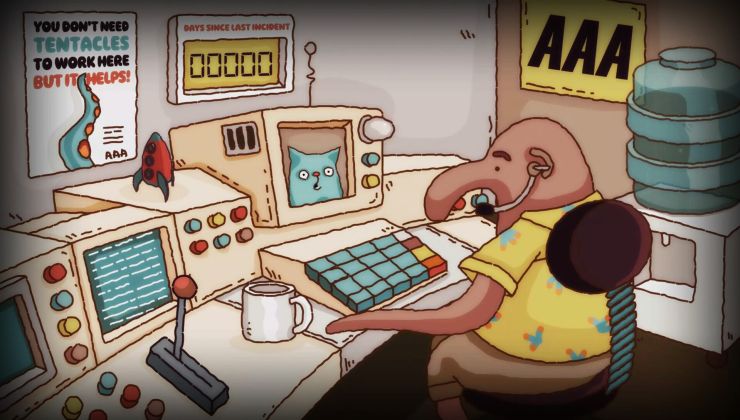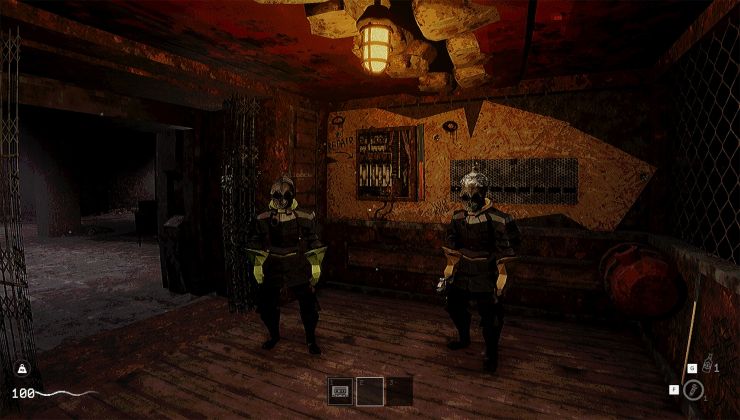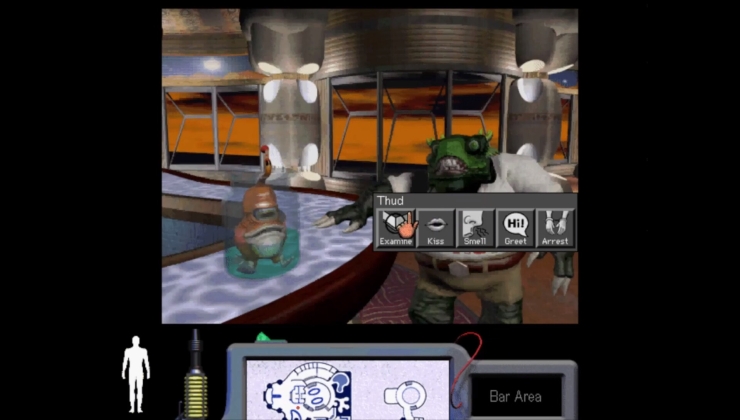We've all been there right? You paid for a game, it required an active internet connection and a couple of years later the publisher decided they're done with it and shut it down leaving you with a broken game. Annoying.
Very annoying. It repeatedly happens, mostly AAA publishers that do it and their games are often quite expensive too. One of the most recent is The Crew from Ubisoft, a game that until late December last year cost £25.99. The developers at Ubisoft Ivory Tower announced on December 14th that as of March 31st, 2024 the servers would be shut down and so it will no longer be playable for anyone. The Crew 2 is still online, and Ubisoft are about to launch The Crew Motorfest on Steam on April 18th.
So now YouTuber Ross Scott of Accursed Farms, has launched the Stop Killing Games campaign to try and better highlight the issue. As noted on the campaign website: "An increasing number of videogames are sold as goods, but designed to be completely unplayable for everyone as soon as support ends. The legality of this practice is untested worldwide, and many governments do not have clear laws regarding these actions. It is our goal to have authorities examine this behavior and hopefully end it, as it is an assault on both consumer rights and preservation of media. We are pursuing this in two ways:"

Direct Link
It's definitely an interesting and often frustrating issue, especially for games that could seemingly continue to let you play offline without too much trouble. It's a complicated issue though, and the campaign might not end up going anywhere, but it's certainly going to be interesting to watch.
Unquestionably a campaign I can get behind though, because I've said for years it's a really poor situation for consumers to have your purchase suddenly stop working forever that you've not just put money into but often a ton of your time. It's a question of preservation too, the games are just — gone. I miss the days where you could just host your own server.
What are your thoughts?
Sorry, I see it differently. It's one thing what you think you're buying and another thing what you're paying for. In my opinion, you can never buy a game because it will always be the property of its creator.In my opinion, that's utter nonsense, and also rapidly becomes incoherent if one starts to compare it with one's ideas about various other kinds of things you buy that have creators. If I buy an item of clothing directly from the person who designed and sewed it, who certainly "created" it and put their artistic talent into designing it, so that it embodies their "intellectual property", does that mean that (unlike if I buy a cheap shirt made in a sweatshop to old designs) they can come by my place and repossess it? No. So how is the video game different conceptually?
The difference with video games is all about what sellers are able to do, not with ethical differences in the nature of purchase. Then they come up with excuses to justify the bad behaviour they've discovered they are capable of with a digital good that can communicate on the internet.
If the game is a hit, I believe releasing its source code basically guarantees it will live on as long as it has a dedicated cult following.
We've all been there right? You paid for a game, it required an active internet connection and a couple of years later the publisher decided they're done with it and shut it down leaving you with a broken game.
Not to sound like a GOG fanboy, but this is often where GOG steps in. They convince the developer/publisher to drop the always-online DRM on a single-player game and put it back on the market (the "compromise" being that any multiplayer components are usually disabled
Full automatic refunds for every copy when a company kills the game is much simpler, and removes most of the financial incentive for that undesirable behaviour.
Love the simplicity of this idea. I suspect the end result would be that, rather than having to refund all purchasers of the game, the developer/publisher will simply remove any DRM that will kill single-player gameplay. The game is still playable, so no refunds required ...
What if an MMORPG like Everquest,World of Warcraft or Guildwars is no longer profitable and servers go down?
What if a franchise is no longer interesting for the owner like Robin Hood the Legend of Sherwood?
What if the hardware is no longer sold like a Super Nintendo or Megadrive?
It wouldnt hurt the owner of the material to release sourcecode, schematics, assets ,server side binaries, level editors, tools , source of the tools and so on to make it possible to archive it for the future.
Books, Films , art, is preserved in museums and special archives too.
Even Companies like GoG or Blizzard themselfes have to reverse engineer games because only binaries are left and the rest long lost.
Last edited by tpau on 3 Apr 2024 at 6:34 pm UTC
Full automatic refunds for every copy when a company kills the game is much simpler, and removes most of the financial incentive for that undesirable behaviour (you've still given them an interest-free loan, after all).I immediately see some loopholes that would have to be addressed; what does it mean to "kill" a game? Yes, taking down all the servers of a game where players can't host servers would be killing it, no question there. What about leaving exactly one server (that can handle, say, 12 players max) online? Not technically killing it, even though the other (say) 49,988 people who bought the game can't play it if the server is full.
Not that I'm against game preservation — I'm all for it, and best of luck to Ross — I just think it's complicated.
Yes our customer rights, and customer right observation associations are strong, no the justice still doesn't understand what games are, what's at stake and how heavy the game industry is, they just don't care much.
Finally, if (and that's a big if) things move a bit, I'm pretty confident it'll backfire, sure you'll be able to launch your game offline but it will miss features, content or might even soft lock, and at the slightest OS/driver major change it will break. In the end it might come down to the community to mod the game to fix it, as it always has been.
I'd really like to believe we could coerce the industry into better practices, but I don't think that will happen, not until individuals (sharing our values) in said studios will be able unionize, raise their voice, be heard and circumvent sales and marketing departments. And that's a battle to be fought in every studio.
Random thoughts on that topic.
Exclusively multiplayer games, MMO's, battle royales, moba's..
Wouldn't they'd immediately loose their appeal ? But sure, we should still always be able to host a private server and have some fun among friends.
But in the end, that's where preservation would end up the costliest, MMO publisher won't spend the slightest cent for the devs to either release a commercial customer solution or even open sourcing the whole thing.
As players we perceive games as art, they are merely cash machines to most publishers.
Indies will go the preservation route but indies are mostly able to fund offline single-players.
Finally, I initially drafted huge pseudo philosophical paragraphs, but I'll just ask directly, what are your opinions about loss ?
It's somehow both the most tragic and beautiful thing. You might react virulently to that statement, I get it, loss is tough, that's why.
But have we collectively decided yet to archive and digitize every single bit of our existences from now on ?
As an example, I can barely play my most favourite game ever, maybe 'cause I'm depressed, but more specifically I think it's because I used to play it in a very specific setting that's long gone and forever lost.
Exclusively multiplayer games, MMO's, battle royales, moba's..
Wouldn't they'd immediately loose their appeal ? But sure, we should still always be able to host a private server and have some fun among friends.
But in the end, that's where preservation would end up the costliest, MMO publisher won't spend the slightest cent for the devs to either release a commercial customer solution or even open sourcing the whole thing.
As players we perceive games as art, they are merely cash machines to most publishers.
Indies will go the preservation route but indies are mostly able to fund offline single-players.
The FAQ to the project covers that. There have been MMO games that have been kept online, maybe you can't keep the same number of players or will lose some features but smaller server is still better than no server, etc etc.
Finally, I initially drafted huge pseudo philosophical paragraphs, but I'll just ask directly, what are your opinions about loss ?
It's somehow both the most tragic and beautiful thing. You might react virulently to that statement, I get it, loss is tough, that's why.
But have we collectively decided yet to archive and digitize every single bit of our existences from now on ?
As an example, I can barely play my most favourite game ever, maybe 'cause I'm depressed, but more specifically I think it's because I used to play it in a very specific setting that's long gone and forever lost.
I think this is something that people involved with actual preservation initiatives, archivists, curators, libraries and so on have dealt with for a long time. Because it is not possible to preserve everything, so everything that is preserved is what someone chose to put effort into preserving. The reasons for that can vary wildly, but the more meaningful something is and for more people, the more likely it becomes that someone will preserve it. And while computers and the internet make it seemingly very easy for a lot of people to make and distribute copies, over longer time scales digital media is just less durable, requires more maintenance, tech changes more often... and we might actually lose more than we did in terms of books and tapes and films (and that is even without DRM and planned obsolescence).
The problem in this case is who controls our shared cultural experiences. Because something can be extremely meaningful to a lot of people that would like to keep it, but it is entirely controlled by a company that won't do it - or might even hinder their independent efforts. The power imbalance means that the interests of a few matter while that of thousands does not. And people get understandably upset about their own powerlessness, about the control others have over their memory, over their culture, over their lives. And in particular regarding companies, the value of something as a commodity - as a product that can be sold - is rarely equal to its cultural significance.
It is the same as when a platform like yahoo answers decide to erase their entire archives. It is not that nothing should be lost... but that people can't choose what to keep, it is entirely up to the platform "owner". Even though the contents are the shared experiences and memories of many people, those people are not part of the decision process, and their desires are ignored.
But in this case worse, as the destruction can affect all extant copies even in personal archives! And the time scales involved are so short that it is not just memories.
There has to be a way I can "like" this more than once.Exclusively multiplayer games, MMO's, battle royales, moba's..
Wouldn't they'd immediately loose their appeal ? But sure, we should still always be able to host a private server and have some fun among friends.
But in the end, that's where preservation would end up the costliest, MMO publisher won't spend the slightest cent for the devs to either release a commercial customer solution or even open sourcing the whole thing.
As players we perceive games as art, they are merely cash machines to most publishers.
Indies will go the preservation route but indies are mostly able to fund offline single-players.
The FAQ to the project covers that. There have been MMO games that have been kept online, maybe you can't keep the same number of players or will lose some features but smaller server is still better than no server, etc etc.
Finally, I initially drafted huge pseudo philosophical paragraphs, but I'll just ask directly, what are your opinions about loss ?
It's somehow both the most tragic and beautiful thing. You might react virulently to that statement, I get it, loss is tough, that's why.
But have we collectively decided yet to archive and digitize every single bit of our existences from now on ?
As an example, I can barely play my most favourite game ever, maybe 'cause I'm depressed, but more specifically I think it's because I used to play it in a very specific setting that's long gone and forever lost.
I think this is something that people involved with actual preservation initiatives, archivists, curators, libraries and so on have dealt with for a long time. Because it is not possible to preserve everything, so everything that is preserved is what someone chose to put effort into preserving. The reasons for that can vary wildly, but the more meaningful something is and for more people, the more likely it becomes that someone will preserve it. And while computers and the internet make it seemingly very easy for a lot of people to make and distribute copies, over longer time scales digital media is just less durable, requires more maintenance, tech changes more often... and we might actually lose more than we did in terms of books and tapes and films (and that is even without DRM and planned obsolescence).
The problem in this case is who controls our shared cultural experiences. Because something can be extremely meaningful to a lot of people that would like to keep it, but it is entirely controlled by a company that won't do it - or might even hinder their independent efforts. The power imbalance means that the interests of a few matter while that of thousands does not. And people get understandably upset about their own powerlessness, about the control others have over their memory, over their culture, over their lives. And in particular regarding companies, the value of something as a commodity - as a product that can be sold - is rarely equal to its cultural significance.
It is the same as when a platform like yahoo answers decide to erase their entire archives. It is not that nothing should be lost... but that people can't choose what to keep, it is entirely up to the platform "owner". Even though the contents are the shared experiences and memories of many people, those people are not part of the decision process, and their desires are ignored.
But in this case worse, as the destruction can affect all extant copies even in personal archives! And the time scales involved are so short that it is not just memories.
I politely told them I wouldn't really use it. How much was it?
USD $100-200.
[Que Ejecting Coffee From Mouth.jpg]
It was still returnable, so I told them to return it and keep the money -- they put it towards a new cellphone that broke that week.
You couldn't pay me to make this nightmare tech part of my existence. Life is already miserable enough without the implications of always on invisible tech tracking every time you want to use a toilet, a cup, or whatever else.
We used to call this shit fucking creepy, and people who peddled it creepy.
Edit: Imagine a world with a "Smart Shower" designed to give you your water ration -- complete with IoT Camera and Motion Sensor -- just to turn on and off the water and totally not to collect data on your junk and sell you penis pills lmao.
!Hal 9000
Last edited by ElectricPrism on 3 Apr 2024 at 10:59 pm UTC
The correct solution is to try and convince consumers to stop buying those kinds of products (good luck), and market forces will naturally take care of the rest.
100% behind this.The solution is simple: if a game is sold as a service, or as a code in box, and you don't want to support it with your money, then don't. There's no need for the government to get involved and make things worse, as governments notoriously do.
I want to see legislation put in place to make it illegal to take away access from a game after purchase and also bring in legislation to allow re sale of digital games.
I would also like to see physical releases with a download code banned. If I buy a physical copy then I want a fully offline playable game on the disk.
If the online multiplayer servers of a game is shut down then the games online portion should be open sourced to allow preservation.
If publishers abandon a game by not releasing a game for active purchase on any platform then that game should be considered abandonware and thus be put into public domain.
We need to fight back.
What's not so simple is asking a company to release code that they may not have the legal right to release as open source. In the case of "abandonware", the game may include licensed art and music that the respective owners haven't abandoned and can not be put into public domain.
As is usual in these kinds of debates, idealism is often in direct conflict with reality.
Sorry, I see it differently. It's one thing what you think you're buying and another thing what you're paying for. In my opinion, you can never buy a game because it will always be the property of its creator. In reality you are only paying for the legitimate right to use it, with permission of its creator. You cannot resell it, nor rent it, nor make any business with that right without the permission of the creator of the game. So the creator (let's assume that the creator is the owner of the rights), at any time he chooses, can stop supporting the game.
It seems to me that if you know what you are paying for, the disappointment is less.
While this holds true for electronic 'works' in general, what I really find irritating is that for all the media (written word, music, video, games, etc) the rights management and commertialization stems from the editorial tradition. In that (until very recently), creators have to put up with publishers to get their works known and distributed. For the longest time self publishing has been (and still is in most cases) simply way too expensive. And is in that paradigm that these mega corporations got to the position we currently are. I really, really despise the model and paradigm, alas I do reckon that it has been (and for many still is) the only way to distribute works.
(In the context of gaming...) Alas, in the face of the imminent extintion of physical forms (media) for games (consoles being the last bastion), all electronic 'gaming works' are subject to these practices. A paradigm shift must occur if there is any hope to stop this from happening, and most likely, it will only happen if the gaming community also changes consumption habits of games... Campaigns like this may render the situation a tad more visible, but most likely will do little for shifting consumption habits.
At this point seems very unlikely that the industry at large would do anything in favor of the gamers, and indeed it would seem like the only plausible cause of action would be via legislation, and that may even prove difficult.
So yes, the only way to avoid dissapoitment is to avoid buying.
A paradigm shift must occur if there is any hope to stop this from happening, and most likely, it will only happen ifthe revolution comes and capitalism is thrown into the dustbin of history . . .
This is very much reminding me of that Cory Doctorow story Unauthorized Bread, which of course isn't in any way a satirical call to action on all this stuff.Thanks SO much for linking to this one, PLG.
The solution is simple: if a game is sold as a service, or as a code in box, and you don't want to support it with your money, then don't. There's no need for the government to get involved and make things worse, as governments notoriously do.
As is usual in these kinds of debates, idealism is often in direct conflict with reality.
Yeah totally crazy how some people put 100% faith in the free market magically resolving all issues on its own...
The solution is simple: if a game is sold as a service, or as a code in box, and you don't want to support it with your money, then don't. There's no need for the government to get involved and make things worse, as governments notoriously do.
As is usual in these kinds of debates, idealism is often in direct conflict with reality.
Yeah totally crazy how some people put 100% faith in the free market magically resolving all issues on its own...
The best way to get a company's attention is to hit them where it hurts: their profit margin. The problem here is that I don't think there are enough people who really care about this. When a game goes offline, the majority of folks will just shrug their shoulders and move on to the next one, so companies have no incentive to change. It's why "free to play" continues to be so popular -- and profitable -- despite the games themselves being objectively terrible. Another case where idealism runs face first into reality.
Since the only thing you have any real control over is your own behavior, then the best solution is to not support companies that employ business practices you happen to disagree with.
Last edited by Mountain Man on 5 Apr 2024 at 12:48 pm UTC
Once that is international law by treaty corporate can shut whatever down whenever and in a few years the community will have the code to resurrect it at their own expense. Honestly the EU by itself could make this happen because their consumer protection courts seem to actually do something every now and again.
Also, software needs to be relocated from copyright to patent law. Basically we handle intellectual property protection completely wrong.
Last edited by jarhead_h on 5 Apr 2024 at 6:33 am UTC











 How to set, change and reset your SteamOS / Steam Deck desktop sudo password
How to set, change and reset your SteamOS / Steam Deck desktop sudo password How to set up Decky Loader on Steam Deck / SteamOS for easy plugins
How to set up Decky Loader on Steam Deck / SteamOS for easy plugins
See more from me